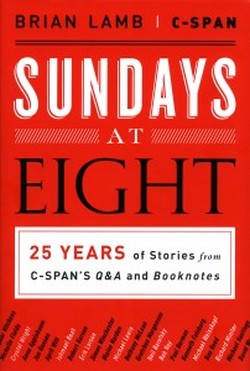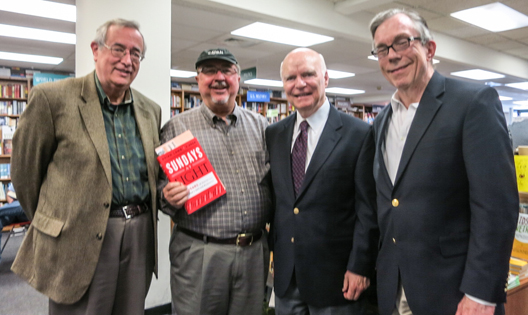 A book review and commentary by Ray Smock I have written before about my great appreciation of and admiration for C-SPAN, the Cable-Satellite Public Affairs Network created by Brian Lamb with the financial backing of the cable television industry. I like the people who run C-SPAN and I applaud C-SPAN’s mission. I made my first appearance on C-SPAN 30 years ago and this book review is not without a strong dose of bias in favor of C-SPAN, the book in question, and the interviewer Brian Lamb. C-SPAN has become an important part of American political culture since it first began broadcasting the floor sessions of the U.S. House of Representatives in 1979, expanding to two stations in 1986 with coverage of the Senate, and eventually adding C-SPAN 3, the American History TV channel, as well as C-SPAN radio. In 1979 only 3.5 million homes were wired for cable TV. Today C-SPAN reaches more than 100 million homes. Today all the interviews and events that C-SPAN has broadcast since 1987 are digitized an available online at the C-SPAN Video Library which includes both audio and video streaming. This amounts to more than 203,000 hours of broadcasting. This includes the entire collection almost 1,400 interviews conducted by Brian Lamb on his long running programs Booknotes and Q &A. C-SPAN’s even-handed approach, its lack of editorial opinion, and its lack of concern for ratings, make it unique in American broadcasting. It is true informational and educational TV without bells, whistles, or commercials. It gives Americans an important window on what Congress is doing each day on the floor of the House and Senate. Its coverage has expanded to include special events, congressional hearings, panel discussions, and interviews on every conceivable topic. Many of Brian Lamb’s interviews have been published in book format. I like the books that have come from these interviews. I like watching the interviews too, but I appreciate seeing them in book form in the medium of the printed word, something that will endure despite the digital revolution going on all around us. The latest of these volumes of interviews is Sundays at Eight: 25 years of Stories from C-SPAN’s Q&A and Booknotes. It is a wonderful, wide-ranging, eclectic, exploration of five broad topics: Stories, American History, Media and Society, Money and Politics, and Post 9/11 America. Some of the names of the persons interviewed are nationally known individuals like the historian David McCullough and journalists like Charles Krauthammer and Roger Mudd. But many of the names may be new to readers who will find interesting stories and observations from thoughtful people who engage the reader’s mind. Journalist Blaine Harden tells the story of Shin Dong-hyuk, born in a North Korean prison camp and the only person known to have escaped to the West. Ishmael Beah reveals his life as a boy soldier in West Africa. Historian Richard Norton Smith recounts what he learned from visiting the gravesites of presidents. This interview inspired Brian Lamb to complete the same journey, adding the gravesites of all the vice presidents too! Brian’s list is complete except for that of Vice President Nelson Rockefeller, where he could only get as far as a locked cemetery gate. This was a pastime that Brian readily admits is on the weird side. Richard Baker and Donald Ritchie the consummate Senate historians, both of whom were interviewed countless times on C-SPAN, talk about their careers of working for and writing about the history of the Senate. Anne Applebaum discusses her book on the Iron Curtain which she says was an exploration of how totalitarianism happens. Neil Barofsky tells about the staggering cost of bailing out Wall Street after the financial sector collapse of 2008. And Kenneth Feinberg, known as 9/11’s “Special Master,” tells about his incredible job as the person assigned by Congress to determine the amount that should be paid from public funds for each death and injury caused by the terrorist attack on the Twin Towers. These are just a few of the fascinating stories in this latest compilation. What ties all these diverse interviews together is their value as stories worthy of being told by scholars, journalists, critics, and participants in the life of this nation and the world in the 21st century. In keeping with Brian Lamb’s and C-SPAN’s philosophy, his questions do not appear this volume. The focus is kept totally on the person telling the story.
Brian Lamb begins this volume by asking the question “What makes for a good interview?” He answers his own question by saying the most essential ingredient is having “a guest with an interesting story to tell, who can tell it well.” But he also says that preparation is important. At a book signing at the Politics & Prose Bookstore in Washington, DC this past Sunday he told the audience that he read every book before he sat down to interview an author. He said a good interviewer has to be a good listener too. He considers these long interviews, placed in the video archive unedited and complete, to be important ways to explore humanity and events. He writes “In today’s media world, our long-form, unedited production style is a polar opposite of Twitter’s 140-character universe.” Well, I hope you will enjoy this volume as much as I have already. I am writing this review before I have finished the book. I feel OK about doing this because this is the kind of book that can be read in pieces. It does not have a grand central theme, a single thesis, a beginning, middle, or an end. In true C-SPAN fashion it is up to you, the reader, to connect the important dots in this collection of interviews. Brian Lamb is not going to tell you what to think about these interviews. If you like Sundays at Eight, Tweet your friends and tell them about it. Comments are closed.
|
Welcome to the Byrd Center Blog! We share content here including research from our archival collections, articles from our director, and information on upcoming events.
Categories
All
Archives
July 2023
|
Our Mission: |
The Byrd Center advances representative democracy by promoting a better understanding of the United States Congress and the Constitution through programs and research that engage citizens.
|
Copyright © Robert C. Byrd Center for Congressional History and Education
|


 RSS Feed
RSS Feed
